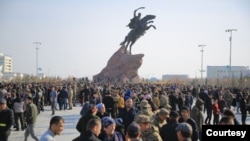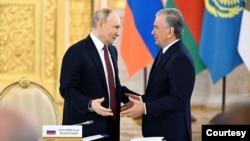In a rare discussion of Central Asia policy on Capitol Hill, a senior legislator told VOA that the United States needs to look past the abysmal human rights records of the countries in the region to confront terrorism and Russian and Chinese influence.
“If we want their help somehow, we need to be able to help them,” Representative Adam Smith, the top Democrat on the House Armed Services Committee, said in a one-on-one interview.
The 27-year House lawmaker was part of the most recent congressional delegation to visit Uzbekistan, along with Armed Services Committee Chair Mike Rogers, Salud Carbajal and Veronica Escobar.
The message they carried to the region was clear: Washington wants to enhance security cooperation while backing political and economic reforms.
The Uzbek leadership, in turn, conveyed enthusiasm for broadening the strategic partnership, which dates to the early 2000s.
During the March 26-27 visit to Tashkent, the delegation met with Uzbek President Shavkat Mirziyoyev, Foreign Minister Bakhtiyor Saidov and Minister of Defense Major General Bakhodir Kurbanov. According to Smith, these discussions underscored Uzbekistan’s pivotal role in “keeping an eye on what’s going on in Afghanistan.”
He sees the Islamic State extremist group, or ISIS, and radicalization in general, as the most prominent terrorism threats.
“Uzbekistan is close and could potentially be a partner in tracking ISIS or other extremist elements,” he said. “So, having a partner in the region that we can work with to identify potential threats and counter radicalization, to make sure that the ideologies don’t take hold or produce terrorists, like the ones that struck in Moscow.”
Several Central Asian citizens were arrested in connection with an attack on a Moscow concert hall in March that killed 144 people. Responsibility was claimed by Islamic State-Khorasan, also known as ISIS-K or IS-K, a regional offshoot of Islamic State.
Despite the U.S. withdrawal from Afghanistan in 2021, Smith said the United States still has interests in that country and that Tashkent, which maintains a tight relationship with the Taliban, can help in that regard.
“Al-Qaida is still in the region. ISIS, obviously. The Taliban are fighting ISIS-K,” the congressman said. “We are still very interested in the region. The difference is we’re not there. We don’t have a good ability to monitor it and act. So, we are looking for partners.”
In Smith’s view, the U.S. must be more strategic in competing with Russia and China as they try to advance their own influence in the region.
Unlike Moscow and Beijing, Washington does not build infrastructure. Instead, it offers technical assistance and works through international financial institutions — endeavors that Smith describes as substantial.
One way the United States could help Uzbekistan, he said, is by helping to find a way to advance the landlocked country’s goal of establishing a rail link through Afghanistan and Pakistan to the Indian Ocean.
Security relationships with countries in the region “have not significantly increased” since the U.S. left Afghanistan, Smith acknowledged, but “we’re trying to build some of those relationships with Uzbekistan.”
In 2021, Congress appropriated $10 million under the Foreign Military Financing program to enhance Central Asia’s border security and counterterrorism capabilities, supplying vehicles, communications equipment and training.
Brushing off Russian speculation that the U.S. is seeking to open a military base in Central Asia, Smith said there are no such efforts.
“We’re seeking partners. We’re not seeking a presence,” he said while emphasizing the importance of overflight agreements and intelligence collaboration.
Smith and other lawmakers, including those in the congressional Uzbekistan and Kazakhstan caucuses, concede that Central Asia has some of the world’s most authoritarian regimes, which suppress dissent and independent media. State Department reports describe the countries as prominent human rights violators.
In Turkmenistan, Gurbanguly Berdimuhamedov ruled for 15 years before passing the presidency to his son, Serdar Berdimuhamedov, in 2022.
In Tajikistan, President Emomali Rahmon has been in power since 1992 and is expected to follow Berdimuhamedov’s path.
In Uzbekistan, a government-engineered constitutional referendum in 2023 allowed Mirziyoyev, president since 2016, to continue for two seven-year terms.
Nursultan Nazarbayev governed Kazakhstan for 30 years before stepping down in 2019. His hand-picked successor, Kassym-Jomart Tokayev, also changed the constitution but promised to leave at the end of his term in 2029.
For years, Kyrgyzstan stood out as having the most democratic potential in the region. However, its current president, Sadyr Japarov, has jailed critics and recently adopted a Russian-style “foreign agents” law.
Smith says the U.S. does not ignore reality, yet he favors pragmatism over preaching.
“If you simply say, ‘We don’t think your elections were as free and fair. We’re out, we’re not working with you,’ those countries can very, very easily turn to China, Russia, Iran and who knows, maybe someday, North Korea. So, we have to understand what’s doable and realistic.”
Having met the Uzbek president in Tashkent, Smith calls Mirziyoyev “a smart guy” who is moving Uzbekistan “in the right direction.”
“I think they are genuinely trying to improve their economy, deal with terrorism but they’ve got a long way to go,” he said.
As on many issues, Democrats and Republicans differ on Central Asia. But Smith stresses that “most members of Congress don’t pay attention to that part of the world. There is not a well thought-out approach.”
“If you were to poll 435 [representatives] over their two-year term, how many times have they thought about Uzbekistan? Very few. I’d say probably 400 of them never thought about it,” Smith said. “So, we are working on that.”




